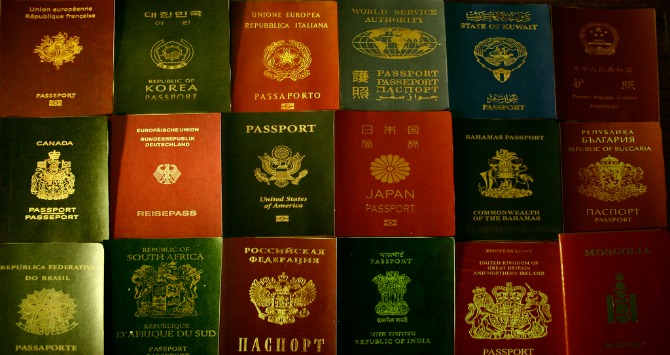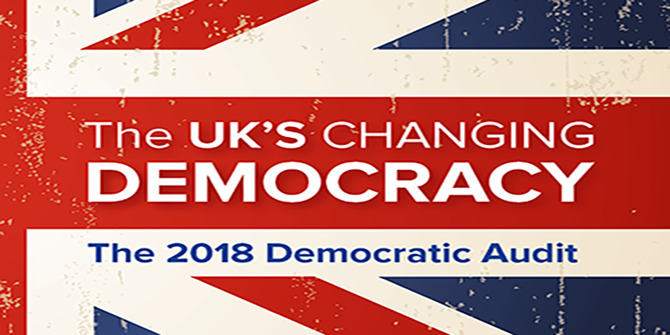 Opponents of immigration have two main concerns: that immigrants are bad for our economy because they force wages down, and bad for our culture for they are at odds with our liberal views. Here, Randall Hansen writes that anti-liberal attitudes need to be challenged whatever their source – minorities who oppose liberal values or Europeans who scapegoat Muslims. He concludes that focus should also be on employment: immigration works only when immigrants work.
Opponents of immigration have two main concerns: that immigrants are bad for our economy because they force wages down, and bad for our culture for they are at odds with our liberal views. Here, Randall Hansen writes that anti-liberal attitudes need to be challenged whatever their source – minorities who oppose liberal values or Europeans who scapegoat Muslims. He concludes that focus should also be on employment: immigration works only when immigrants work.
Immigration is among the defining issues of our time. For years, UK voters have ranked it one of the ‘most important issues facing the country’. As of December 2015, immigration was ranked the most important: 63 per cent of respondents indicated immigration, far ahead of health (39 per cent) and the economy (33 per cent). Anti-immigrant parties in the UK, France, and Denmark enjoy levels of support of around 25 per cent. The mass influx of refugees and asylum seekers over the second half of 2015 rejuvenated the moribund anti-Islamic Patriotic Europeans against the Islamization of the Occident (PEGIDA) movement in Germany, it increased the far right’s share of the vote to over 30 per cent in Austrian elections and helped bring the nationalist right to power in Poland.
Anti-immigration sentiment is partly founded, particularly in Eastern Europe, on xenophobia and anti-Islamic sentiment, but opponents of immigration raise two concerns that cannot be dismissed. First, they argue that immigration disproportionately penalises the poorest members of society, as unskilled migration forced workers’ wages down. Second, it is said that when migration originates in Middle Eastern and North African countries, it brings to Europe individuals at odds with mainstream values on women, sexual minorities, and free speech. The great upsurge in refugees to Germany, Austria, and Sweden have obviously intensified the second concern, as did the coordinated assaults on women in central Cologne and in other German cities on New Year’s Eve.
Taking the first argument first, unskilled immigration does push workers’ wages down, but not by much, and this loss is more than compensated by an overall increase in wages. From 1997 to 2005, a time of large-scale immigration to the UK, wages of the lowest percentile fell by approximately £39per year, while wages overall increased by £332. Tax and spending adjustments could thus transfer the wage loss back to that bottom percentile, and even increase their wages, while leaving a net wage gain from immigration. Immigration, even unskilled immigration, can pay.
Such are the economic issues at stake. But for many – frankly, too many – immigration is a question of the second concern: identity and culture. Since 11 September 2001, the global immigration debate has centred, often to an excessive degree, on Muslims and Islam, and it has occurred against the backdrop of an upsurge in anti-Islamic sentiment and a mobilization by some political parties around the threat posed by Islam to Europe and European values.
As too many Europeans have rejected Muslims, too many Muslims in Europe have rejected liberalism. A depressingly familiar dynamic emerged in the 1988/1989 Rushdie Affair and continued through to the Danish cartoon controversy of 2006 and the Charlie Hebdo murders of 2015. In all three cases, artists produced works deemed by some (mostly) Muslims as offensive to Islam. Protests, threats and violence followed, and significant numbers of commentators argued that, though they in principle supported free speech, artists and intellectuals should avoid offending Muslims.
 Image credit: Baigal Byamba CC BY
Image credit: Baigal Byamba CC BY
So where does this leave Britain and Europe? Coming back to the economics, the case in favour of skilled immigration is clear, and no one can rationally dispute it. Unskilled immigration is more complicated, as it can impose a fiscal cost on society, but still produces economic benefits. These can only, however, be tapped if three conditions are in place. First, Britons and other Europeans must believe that their governments can manage immigration. When this perception vanishes – as it did in Germany between the 1990s and today, in the UK in the later 1990s and today, and in the United States in the early 1990s and the mid-2000s – public support for immigration collapses. It is therefore essential that the European Union regains control over its external borders.
Second, as migration can oscillate easily between a (low) net benefit to a (low) net cost, it is essential to bring and to keep immigrants in work. Training and education are of course essential, but welfare policy also plays a role: income assistance for the unemployed cannot be set above the market wage. Doing so can only encourage unemployment, as William Beveridge, who can hardly be qualified as a reactionary, recognised.
Third, anti-liberal action has to be challenged, whatever its source. To tackle Islamophobia, existing legal prohibitions on anti-Muslim discrimination should be robustly applied and should be seen to be applied. Far-right politicians and a few mainstream commentators, who have constructed Muslims as essentially violent and extremist, need to be confronted. The arguments are well-known and well-rehearsed, but they need to be repeated: acts of violence are committed by a tiny minority, and we are too inclined in the case of Muslims to associate such violence with the faith itself or with all its believers. By contrast, when Jews or Christians commit acts of violence, we instinctively regard them as lunatics who are unrepresentative of their faith.[1] Few people believe that Christian fundamentalists shouting ‘God hates fags’ speak for the whole of Christianity.
At the same time, European and British Muslims, like everyone else, need to respect the rules of the liberal game: respect for gender equality (the harassment of women, of the sort seen in Cologne, cannot be tolerated), rights of sexual minorities (the attitudes of some Muslim communities, notably British, towards LGBT people are thoroughly retrograde), and a right of free speech. In the last, the oft-made suggestion that publications of caricatures of the Islamic Prophet Muhammed go beyond the viable limits of free speech, should be treated as it is: absurd.
The right to mock religion, any religion, is so within the bounds of acceptable speech that the fact that there is a debate at all is mystifying. To be sure, publishing crude caricatures of the Prophet is disrespectful and offensive. Respect, however, is a matter of choice and cannot be mandated. Pious Muslims certainly do not respect philanderers, men who enjoy the delights of gay saunas, or women who like a drink.[2] To suggest otherwise, to imply that Muslims should be given a sort of ‘pass’ in matters of free speech, is not only wrong but it is deeply condescending, above all to moderate Muslims, as it suggests that they are somehow not quite as good as the rest of us, that they need to be coddled and protected from offensive speech, and that they cannot grasp basic liberal principles. No less a thinker than the political philosopher Charles Taylor has confidently stated that Muslims cannot understand the distinction between religion and politics. It is hard to imagine a more patronizing statement.
In short, a Britain and Europe of open but managed borders, high immigration and high employment, and a single liberal framework applying to diverse religions can allow European governments to welcome immigrants whilst maintaining public support. The most important issue is not, however, culture. It is rather cash: immigration can only work when immigrants work.
___
Note: the above draws on the author’s recently published work.
 Randall Hansen is Director of the Centre for European, Russian, and Eurasian Studies, Munk School of Global Affairs and Full Professor and Canada Research Chair in Immigration & Governance in the Department of Political Science at the University of Toronto. His published works include Disobeying Hitler: German Resistance after Operation Valkyrie (New York: Oxford University Press, 2014), and Sterilized by the State: Eugenics, Race and the Population Scare in 20th Century North America (New York: Cambridge University Press, 2014).
Randall Hansen is Director of the Centre for European, Russian, and Eurasian Studies, Munk School of Global Affairs and Full Professor and Canada Research Chair in Immigration & Governance in the Department of Political Science at the University of Toronto. His published works include Disobeying Hitler: German Resistance after Operation Valkyrie (New York: Oxford University Press, 2014), and Sterilized by the State: Eugenics, Race and the Population Scare in 20th Century North America (New York: Cambridge University Press, 2014).
[1] A conversation with Erik Bleich clarified this point.
[2] A conversation with Christian Joppke clarified this point.








You didn’t even a dress the cultural concerns at all, whatsoever, besides trailing off on a tangent about cartoons.
The primary dilemma in terms of culture clash is the often conflicting values that immigrants from conservative or traditional third world countries bring to Europe and, really, the downright hatred that they often display towards liberal values and what is perceived as the corrupt decadence of western civilization. We really ought to limit immigration to individuals who are willing to embrace our values wholeheartedly, not just come for a welfare check and then spit in our face.
What is less talked about in polite society (to avoid uncomfortable and less politically sanitary discussion) is the inevitably of where this immigration will lead in the future. But we have to talk about it. It cannot be avoided any longer. If immigrants keep coming in great numbers and having 4 or 5 (or more) children per couple compared to 0-1 child on average for native ancestral European populations, then after a few generations, native Europeans will be a minority on their own ancestral homelands. I know it’s unpleasant but it’s the truth.
If you want to surrender the druids, the Romans, the roundtable, the battle of Hastings, the battle of Agincourt, and all the rest, lie down and die and let foreigners rule the future of your civilization c then we ought to kick you out with them.
I am not a racist. I welcome skilled workers who are willing to embrace our civilization and way of life and benefit our society, wherever they come from. But mass immigration of unskilled, ignorant third world beggars who hate us and reproduce like rabbits with our welfare and benefits is not kindness. It is suicide.